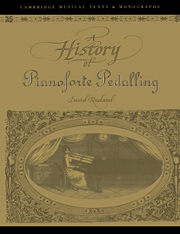Book contents
- Frontmatter
- Contents
- Acknowledgements
- List of abbreviations
- Introduction
- PART I The instruments
- PART II Pedalling and the early pianists
- 3 Documentary accounts of early pedalling
- 4 Early techniques of the pedals as described in tutors
- 5 Early pedal markings
- 6 Mozart and his contemporaries
- PART III Pedalling after c.1800
- APPENDIX: Chapters on pedalling from piano tutors
- Notes
- Select bibliography
- Index
4 - Early techniques of the pedals as described in tutors
Published online by Cambridge University Press: 16 November 2009
- Frontmatter
- Contents
- Acknowledgements
- List of abbreviations
- Introduction
- PART I The instruments
- PART II Pedalling and the early pianists
- 3 Documentary accounts of early pedalling
- 4 Early techniques of the pedals as described in tutors
- 5 Early pedal markings
- 6 Mozart and his contemporaries
- PART III Pedalling after c.1800
- APPENDIX: Chapters on pedalling from piano tutors
- Notes
- Select bibliography
- Index
Summary
The student of pedalling who turns to eighteenth- and early nineteenth-century keyboard tutors for advice on the subject is likely to be disappointed. In view of the great number of tutors published in Europe at the time it is perhaps surprising to find so few references to pedalling, and those that do occur are generally not at all specific about matters of technique. Indeed, before about 1820 only three keyboard tutors discuss stops, levers or pedals in any detail; those by Milchmeyer (1797), Adam (1804) and Steibelt (1809). Each of these contains a chapter or section on the subject which appears in translation in the Appendix to this volume. Tutors by several other leading pianists, such as Clementi, Cramer and Dussek, provide little information of any significance. This is almost certainly because of the market for which they were intended – the large number of amateurs who needed only elementary instruction, rather than comments on more advanced matters of technique.
In addition to material in the tutors of Milchmeyer, Adam and Steibelt a few scattered references to pedalling occur in earlier tutors. These are found mainly, though not exclusively, in German sources and a number of them have already been referred to in Chapter 3. They rarely exceed a sentence or two and never discuss technique in detail. Some conclusions can be drawn from their terminology, however, which is borrowed from that of the organ or harpsichord: Register (Regisire), Zug, and Stimme are the words most frequently used for stops, levers or pedals. Writers probably thought of these devices in the same way as their counterparts on the organ or harpsichord.
- Type
- Chapter
- Information
- A History of Pianoforte Pedalling , pp. 42 - 51Publisher: Cambridge University PressPrint publication year: 1993



